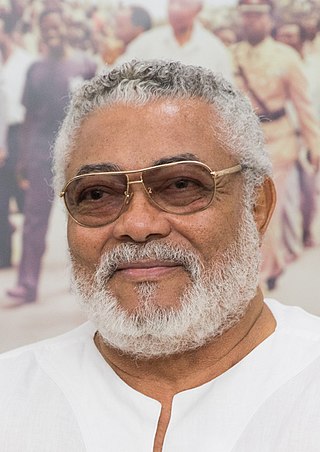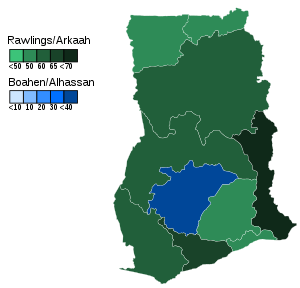
The New Patriotic Party (NPP) is a centre-right and liberal-conservative political party in Ghana. Since the democratisation of Ghana in 1992, it has been one of the two dominant parties in Ghanaian politics, with its leading rival being the centre-left National Democratic Congress (NDC). John Kufuor of the NPP was President of Ghana from 2001 to 2009. At the elections held on 7 December 2004, the party won 129 out of 230 seats. The NPP candidate was Kufuor, who was re-elected as president with 52.75% of the vote. The New Patriotic Party symbol is the African elephant and the New Patriotic Party colours are red, white, and blue.

Jerry John Rawlings was a Ghanaian military officer, aviator and politician who led the country for a brief period in 1979, and then from 1981 to 2001. He led a military junta until 1992, and then served two terms as the democratically elected president of Ghana.
Every Ghanaian Living Everywhere (EGLE) is an inactive political party in terms of elections in Ghana. It has not contested any elections since the 2004 Ghanaian general election. According to Ghanaian law, political parties must have a presence in all districts in order to remain registered, but due to lax enforcement, EGLE remains registered as a party as of 2019.

The National Democratic Congress (NDC) is a social democratic political party in Ghana, founded by Jerry Rawlings, who was Head of State of Ghana from 1981 to 1993 and the President of Ghana from 1993 to 2001. Following the formation of the Provisional National Defence Council (PNDC), which ruled Ghana following the military coup d'état on 31 December 1981, there was pressure from the international community to restore democracy. The NDC was formed as the ruling party ahead of elections in 1992, in which Rawlings was elected president, and in 1996 Rawlings was re-elected as the NDC candidate. Rawlings' second term ended in 2001.

The Parliament of Ghana is the legislative body of the Government of Ghana.

Parliamentary elections were held in Ghana on 29 December 1992, the first since 1979. Voter turnout was just 28.1% amidst a boycott by opposition parties, who had claimed the preceding presidential elections in November – won by former military ruler Jerry Rawlings with 58% of the vote – were fraudulent, with international observers considering them not to have been conducted in a free and fair manner.
The National Independence Party (NIP) is a defunct political party in Ghana. It was formed in 1992 in the run up to the inauguration of the Fourth Republic of Ghana. The party came to an end in 1993 following a merger with another Nkrumahist party.

A referendum on a new constitution was held in Ghana on 28 April 1992. The main issues were the reintroduction of multi-party politics and the division of powers between the president and parliament.

The mass media in Ghana, includes television, radio, internet publishing and newspapers.

Nana Konadu Agyeman-Rawlings is a Ghanaian politician and the widow of former President Jerry Rawlings, under whose capacity she served as the First Lady of Ghana from 4 June 1979 to 24 September 1979 and from 31 December 1981 to 7 January 2001. In 2016 she became the first woman to run for President of Ghana.
The National Democratic Congress (NDC) of Ghana is the ruling party of the country. The party was formed out of the Provisional National Defense Council (PNDC) before the 1992 Ghanaian presidential elections. The party opened nominations for election for the flag bearer of the party from 3 to 10 May 2011. The party also scheduled 8 July 2011 as the date for the election. The purpose of the election will allow the party to select a flag bearer to represent the party in the 2012 Ghanaian presidential election.

Henry Romulus Sawyerr, was a Ghanaian politician and surveyor who was Ghana's Minister for Education from 1993 to 1997; the first person in this post in the Fourth Republic. In the Second Republic, Sawyerr was Member of Parliament (MP) for Osu-Klottey as a non-party candidate. In the Third Republic, he was again elected MP but gave up the seat to be in Limann's cabinet as Minister for Transport and Communications from 1979 to 1981.

General elections were held in Ghana on 7 December 2016 to elect a President and Members of Parliament. They had originally been scheduled for 7 November 2016, but the date was later rejected by Parliament. Former foreign minister Nana Akufo-Addo of the opposition New Patriotic Party was elected President on his third attempt, defeating incumbent President John Mahama of the National Democratic Congress.

ZanetorAgyeman-Rawlings (Dr.) is Ghanaian medical doctor, politician, Activist & Campaigner who is the eldest daughter of the 1st President under the 4th Republic of Ghana Jerry Rawlings (1993–2001) and former first lady Nana Konadu Agyeman (1993–2001). She is a member of the Ghanaian parliament for the Klottey-Korle Constituency and a medical doctor and humanitarian. She is also a member of the National Democratic Congress (NDC) on which she won her seat to be a member of parliament for her constituency.
The National Reconciliation Commission was established in January 2002 by the Parliament of Ghana. The goal of the commission was to establish an "accurate, complete and historical record of violations and abuses of human rights inflicted on persons by public institutions and holders of public office during periods of unconstitutional government." The Commission was formed after a new democratic party won the elections in 2000. The Commission covered human rights violations in Ghana from 1957 to 1993. It looked into government abuses and military coups staged by former president Jerry Rawlings. The members of the Commission worked until the end of 2004.

General elections were held in Ghana on 7 December 2020. Incumbent President Nana Akufo-Addo of the New Patriotic Party (NPP) was re-elected in the first round after securing a majority of the votes. Former President John Dramani Mahama announced that he would contest the results. At the Supreme Court, a petition challenging the result was filed on 30 December, and unanimously dismissed on 4 March 2021 for lack of merit.
Charles Kofi Agbenaza was a Ghanaian politician and a member of the 2nd and 3rd parliament of the 4th republic of Ghana. He is a former member of Parliament for the Ketu South constituency as well as a former deputy regional minister of the Volta Region of Ghana.

Daniel Ohene Agyekum is a Ghanaian diplomat and politician who is member of the National Democratic Congress (NDC), who served as the former Ambassador to the United States of America during the John Evans Atta Mills government between 2009 and 2013. He has served as Regional Minister for Eastern, Ashanti and Greater Accra regions in the past. He also served as Minister of state in charge of Chieftaincy and State Protocol during the Jerry John Rawlings Government from 2000 to 2001.

The Political history of Ghana recounts the history of varying political systems that existed in Ghana during pre-colonial times, the colonial era and after independence. Pre-colonial Ghana was made up of several states and ethnic groups whose political system was categorized by 3 main administrative models; Centralized, Non-centralized and Theocratic states. In the colonial era, the British Empire employed different forms of government among its four territorial possessions in the Gold Coast. Indirect rule was implemented in the late 19th century after its success in Northern Nigeria. From the 1940s, native Ghanaians yearned for more autonomy. This resulted in the several constitutional reforms as well as the creation of the office of the Prime Minister in 1952.















